4-wheeling at Carnegie SVRA
2012-01-09
Jess and I like to get pretty far into the back-country, yet we often don't have time to walk there (I mean, it's a long walk from the bay area to the Sierras). As a result we sometimes find ourselves in a vehicle on dicey trails. With the ability to carry gear, sleep in it, and be migratory in the modern era, a vehicle is surprisingly tempting as part of an outdoors lifestyle. Anyway, that's my excuse, it's also possible that 4-wheeling is just fun.
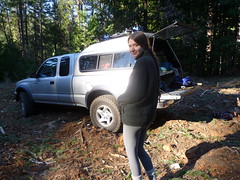
A while ago I created a mailing list at work for 4-wheeling. The other day someone posted that they'd just gotten a new jeep and wanted to play with it. My friends who wheel aren't in the area, so I haven't been able to try anything where I might get stuck. I'd been to Hollister off-road park before (with a friend who's rig was too small to pull me out), and have tidbits of experience here and there, but nothing very intense. Carnegie SVRA is nearby, and neither of us had been there, so it sounded like a good option.
Some quick terminology
-
A "rig" is a vehicle, whatever it is you've got.
-
4-wheeling refers to driving a "rig" in an area that would be very difficult or impossible to traverse in a vehicle that isn't built for the task, down ruddy dirt roads, up rocky trails, through mudholes and up and down steep hills.
-
A Transfer case, or T-case, is the component in a vehicle which transfers energy from the transmission to all sets of wheels. Often these are switchable 2-wheel to 4-wheel drive. Some, like the one on our truck, also act as a second transmission, letting you go to gears far below "first". Most such vehicles have only 2 gears in the T-case, "high" and "low". High is for normal driving, low is for the tricky stuff.
-
Ground clearance (often just clearance) is the distance between the ground and your vehicle when sitting on flat ground. This is a very relevant property if your vehicle is on a road with big rocks for example.
-
Breakover angle: Consider a wedge sitting on the ground point up, imagine driving a wheeled vehicle over that wedge. A vehicle can drive over a very shallow angled wedge, but if the point is sharp it will get stuck or "high-centered" sitting on the point with one set of wheels off the ground. The sharpest angle at which a vehicle can still drive over the wedge is called the breakover angle.
-
Entrance angle: Imagine a car coming down an incline towards a flat surface. At some angle of incline the vehicle will just sit on it's bumper when it reaches the flat surface, instead of sitting on it's wheels. The maximum angle where it's wheels hit instead is called the entrance angle
-
Exit angle is the same concept as entrance angle, but the vehicle is transitioning from a flat surface to the incline (driving forwards still)
So, that's some quick 4-wheeling jargon. Now for the story.
Story
Manish brought his wife (apologies, I'm not going to try to spell her name, but she is the excellent photographer who took all the photos in this post) and their dog, as well as a couple of handheld GMRS radios (I haven't gotten any of my radios speaking GMRS yet). Jess was feeling tired so didn't come along. We met near our abodes and caravaned up to Carnegie for the day.
Well, it turns out Carnegie SVRA (unlike Hollister) has no trails at all for 4x4. On the other hand, they do have a pretty amusing "play area" for 4x4s. Being relatively new anyway this satisfied our appetites for a while, though I probably wouldn't go back.
Here's our vehicles:
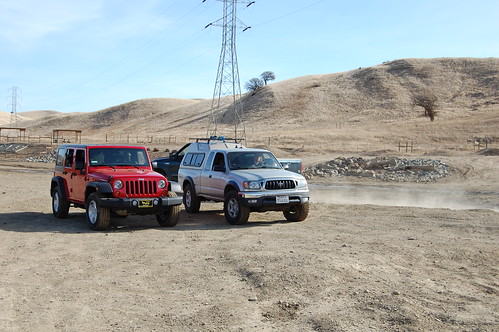
Manish's Jeep (red) is 100% stock, automatic transmission 2012 4d jeep wrangler sport, about 2 weeks old. My pickup (silver) is a nearly stock 2002, manual trans, 2.7L, extended cab, tacoma TRD (no locker), but I swapped the tires to 265/75 BFGs instead of 265/70. Jess and I call our truck "Jane". Overall I had a bit more clearance and better offroad tires than Manish, but he had a bit better skids and entrance/exit angles, making the rigs about equally capable. If you didn't follow all the adjectives don't worry, I threw it them in case someone cares.
After a quick run through the sand-pit, playing a bit on the bumps, and realizing our breakover angles were not sufficient for the harder "bumps", we decided to try going *down* the "steps". Up was a bit above our levels still. I went first:
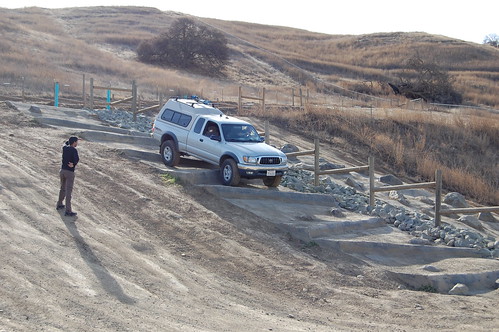
I scraped the tail-pipe once, and at the bottom I bottomed out due to entrance angle.

Luckily, the tacoma comes stock with a lightweight skid up front, so no damage was done (people will say it's just for looks, but it's better than that - just don't try and sit the whole car on it and slide over a rock). The plate hit pretty hard, but after suspension rebound my front wheels were on the ground, so I could drive out without a problem. The suspension on Jane is pretty shot, so if I let her drop a bit too hard off an edge she'll bounce pretty badly. This meant I bottomed out the suspension several times when I came off the brake a bit too much - I kept thinking I'd kissed a rock when I hadn't.
During this descent I tried a couple of techniques (Manish used descent control on his jeep - cheater :P). I tried putting it in gear and leaving the clutch in, but that never worked out well. I wanted to go too slowly for my crawl ratio (slower than the lowest gear on the truck with the engine spinning ~200 rpm, below that it dies). I also kept wanting to stop, which required working the clutch anyway. Thus I kept killing the engine. Instead I found using just the brakes worked better when I wanted to move THIS slowly. I found it surprisingly easy to do it with just the brakes - though lower crawl ratio is clearly the way to go if you have the time and capital.
Here's Manish doing the same.
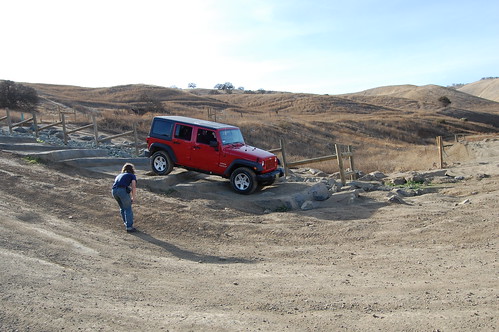
He dragged his skids pretty badly once or twice, but made it down safe.
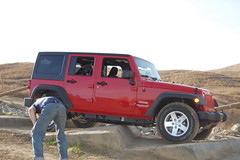
Any time manish got 2 tires coming off a drop at the same time his rig would slide. This is the downside to more street'ish tires. He had traditional stock streety A/T SUV/truck tire (think AT dueler). The larger lugs, softer rubber, and larger diameter on my BFGs let me avoid sliding a lot more often.
We took a look at the main mud-pit, but after talking to someone who'd tried it and gotten stuck we decided it was way too much for our rigs. Next we decided to try the "frame-twister" which was a set or rock and log obstacles. This is relatively tame in the greater scheme of things. A more heavily modded rig could go relatively fast, for a good stock rig it's a slow but doable crawl.
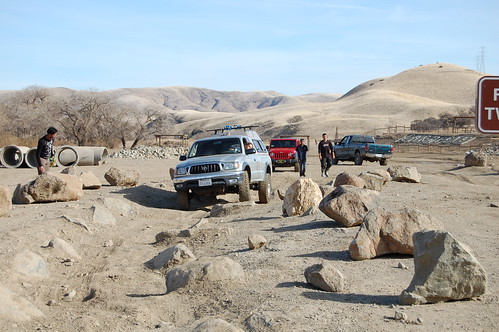

We watched a stock land-rover do it as well, and a kid in a larger truck do it several times quite quickly. Unsurprisingly he ended up blowing a tire - presumably just from the pressure of running direct up against a rock at speed. He was running A/T Revo 2's, and his rig was enourmous. Extended bed, extended cab, pickup with a V10. We helped them change their tire
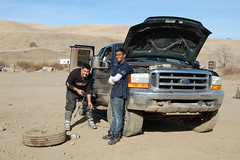
My main take-aways from this trip:
1) These vehicles, even stock, are both massively capable. I was vaguely aware of this, but I still keep being surprised.
2) Going slowly and smoothly in a stock auto is a lot easier than going slowly and smoothly in a stock manual. Even with the low range on the transfer case, it's just not as low as you want. Don't get me wrong, I'm not giving up manual any day soon. I love using it for steep descents and for general driving, but for anything crazier than what we were doing I'd want a second T-case to raise the crawl ratio. Surprisingly, I DIDN'T burn the clutch at all! Despite floating the clutch a bit to crawl slowly over a number of the rocks (Idle was insufficient torque, that's what I get for driving a 2.7L I4).
3) While Jane's clearance is sufficient for a lot of somewhat crazy stuff, another inch or two would be amazing. Good thing I have a lift kit in the garage just waiting to be installed :). This is an all suspension kit (bought largely in parts), so it should increase suspension travel and flex as well. Most importantly it'll replace our blown springs and dampers.
More photos here http://www.flickr.com/photos/smalladventures/sets/72157628817096551/ (courtesy of Manish Jain's wife)

